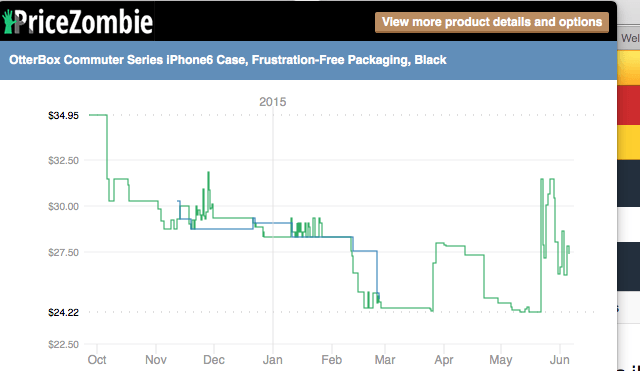Today I read an interesting post on HackerNews about a price comparison site, PriceZombie, being kicked out of the Amazon Associates program. The Amazon Associates program is Amazon’s affiliate network. Amazon pays a commision for any sales you bring in through affiliate links. Since I have a pretty extensive background with affiliate marketing I have a few thoughts on the dilemma PriceZombie is facing.
After being previously told we were in 100% compliance with the rules, our Amazon affiliate account was closed a few months ago. Amazon claimed we were violating their rules against showing product and price information that was more than 24 hours old. Obviously, this is something ALL price history trackers do, not just PriceZombie.
It seems obvious that PriceZombie was in contact with a representative of Amazon and that they thought they were complying with the terms of their affiliate agreement. However, the account was then banned for “violating their rules against showing product and price information that was more than 24 hours old.”
My first thought, not unlike the HackerNews commenters, was that PriceZombie violated the terms of their agreement and they need to suck it up. However, I’m an Amazon Associate and I don’t remember anything about not using historical pricing data in the agreement. I took at look at the newest affiliate agreement and couldn’t find any mention.
PriceZombie uses the Amazon Advertising API so I took a look at that agreement. No mentions of not being allowed to use historical pricing data. In fact this agreement seems to suggest you are allowed to show historical prices as long as you display a date with that price:
(o) You will include a date/time stamp adjacent to your display of pricing or availability information on your application if you obtain Product Advertising Content from a Data Feed, or if you call the Product Advertising API or refresh the Product Advertising Content displayed on your application less frequently than hourly. However, during the same day on which you requested and refreshed the pricing and availability information displayed on your application, you may omit the date portion of the stamp
I did find a section stating that you cannot store images and that you should update the content every 24 hours. This probably covers the PriceZombie case but it’s not very explicit.
(n) You will not store or cache Product Advertising Content consisting of an image, but you may store a link to Product Advertising Content consisting of an image for up to 24 hours. You may store other Product Advertising Content that does not consist of images for caching purposes for up to 24 hours, but if you do so you must immediately thereafter refresh and re-display the Product Advertising Content by making a call to the Product Advertising API or retrieving a new Data Feed and refreshing the Product Advertising Content on your application immediately thereafter.
I will assume PriceZombie was kicked out for a technicality in the previous rule. If so then why are so many other Amazon price tracking sites still operational? Amazon was making money from those affiliate sales. Why would they want to stop that revenue? Were the margins too thin on the PriceZombie conversions? Is Amazon trying to cover up the fact that it’s been raising prices? None of this really matters.
The Real Lesson Today
People are caught up in the debate about the possible violation of Amazon Terms of Service, but they’re missing the real point here. If you are planning to build a business around any 3rd party API you are exposing yourself to the greatest risk I can think of. Your business can die in a blink of an eye and it’s completely beyond your control. Someone else controls your revenue and can turn it off with the flip of a switch.
It doesn’t matter if PriceZombie violated the TOS. Amazon has no obligation to allow anyone access to it’s API or affiliate program. They don’t even need a reason to deny you access. They can allow Joe’s price tracker to keep running even though they killed PriceZombie. There is no implied equality when it comes to business agreements. They could terminate your agreement at anytime and for any or no reason. Kind of like my employer can terminate my employment without reason.
The real thing we learned today is that you can’t build the core of your business around a 3rd party API. Situations like this happen all the time and people still put their bread and butter in somebody else’s basket. PriceZombie could have taken some steps to ensure they would survive if that Amazon money stopped rolling in but they didn’t. Now it’s too late.
I’m even guilty of this. I’ve built sites in the past with Amazon Associates as the sole monetization but I’ve never seen them as a long term business and I always knew the risk of termination was there. I’ve changed my ways of thinking in the past few years. One of the major changes is the realization that if you are relying on 3rd party monetization then you have hobby, not a business.
Real businesses have something to sell.
I’m not suggesting anyone do this but there is a part of me that would find it extremely hilarious if PriceZombie would 301 redirect all of their pages to the same product on Jet.com. I really want them to update all the links on the price tracker to Jet links but that would be a legal problem using Amazon’s API content improperly. So 301 redirect would probably be safer. Obviously I’m not a lawyer.

